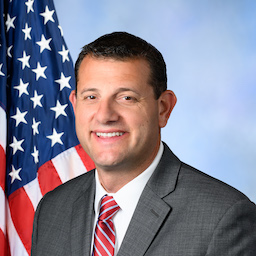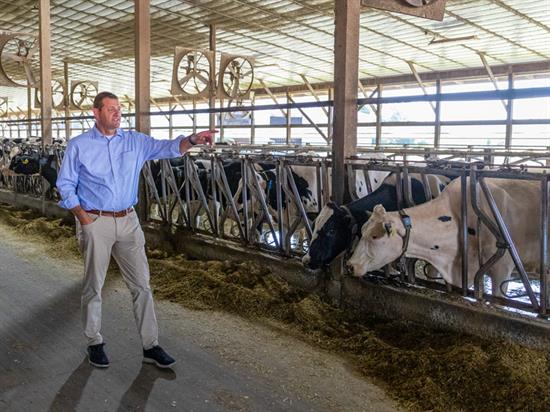- Home
- About
-
Services
- Art Competition
- Community Project Funding Map
- Congressional App Contest
- Congressional Certificate
- Event Request
- Flag Request
- Grants
- Grant Letters of Support
- Help with a Federal Agency
- Inauguration
- Internships
- Kids Page
- Meeting Request
- Service Academy Nominations
- Tour Requests
- Vietnam Veteran Commemoration
- Government Shutdown FAQ
- Issues
- Media
- Contact

In the News
Disaster relief needed to help ag producersAgri-Pulse Op-Ed
Washington,
October 25, 2024
The state of California is the fifth largest supplier of food in the world and accounts for 12.5% of the nation's agricultural production. However, recent natural disasters and extreme weather have put California’s farmers' ability to grow food and the security of our nation’s food supply at risk.
Read the Op-Ed in Agri-Pulse
The state of California is the fifth largest supplier of food in the world and accounts for 12.5% of the nation's agricultural production. However, recent natural disasters and extreme weather have put California’s farmers' ability to grow food and the security of our nation’s food supply at risk. After years of extreme drought that cost California’s agriculture industry over $1 billion per year, atmospheric rivers and a lack of water storage infrastructure led to severe flooding throughout California’s Central Valley last year. Farmers went from fallowing land due to an unreliable water supply to dealing with thousands of acres of farmland under water. It seems those who provide food for the nation can’t seem to catch a break. While impacts on California’s agriculture industry are top of mind for me, farmers and producers across the entire United States have experienced significant agricultural losses due to floods, hurricanes, droughts, tornadoes, wildfires, and weather-related pest damages over the last few years. According to the American Farm Bureau Federation, severe weather and major disasters caused over $21 billion in crop losses just in 2023 alone. The states with the largest losses due to severe weather include Texas, Kansas, Florida, and California. Natural disasters have severely affected crop and livestock production and continue to jeopardize our nation’s food security, as well as the economic stability of our rural communities. We must act to provide much-needed assistance for farmers, ranchers, and rural communities impacted by natural disasters. I introduced the Agriculture Disaster Relief Supplemental Appropriations Act to provide the U.S. Department of Agriculture with an additional $14 billion to assist producers impacted by natural disaster losses in 2023. In a perfect world, this kind of ad hoc assistance wouldn’t be necessary. Unfortunately, there are gaps in existing risk management programs at the USDA that necessitate additional support. Take dairy as an example. During the flooding in the Central Valley in 2023, dairy producers incurred significant costs from property damage, feed losses, and transportation costs from moving livestock. When this happened, the industry quickly realized there were limited options for them to be reimbursed for these costs. In a similar situation in Puerto Rico in 2017, then-Agriculture Secretary Sonny Purdue used Commodity Credit Corporation emergency assistance funds to help dairy producers. Unfortunately, Ag Secretary Tom Vilsack has not utilized his full authority within the CCC to do the same for producers impacted by the 2023 disasters. I’ve asked the secretary directly why dairy farmers who need help are getting left behind, and I introduced legislation so that there’s no question that the Secretary has the authority to use these funds. The Agriculture Disaster Relief Supplemental Appropriations Act aims to make existing disaster programs more accessible for the dairy industry. The bill includes a $1.5 billion carveout for livestock losses and provides expanded assistance to livestock producers, including relocation of livestock, feed crop losses, and shelter-in-place procedures. Right now, Congress is working on reauthorizing a new farm bill to improve and strengthen some of these disaster programs. But the timing of a new five-year authorization of the farm bill is uncertain, and our producers deserve timely access to relief. Many producers have been waiting for assistance with natural disasters since 2022. While we work on a new farm bill that includes additional crop insurance mechanisms, those tools will not be accessible for producers soon enough. Providing immediate assistance in the meantime is critical. America’s farmers are resilient, but sometimes nature changes course, and producers are dealt another unpredictable set of circumstances. We must ensure our farmers are equipped to deal with these circumstances to secure the safety of our nation’s food supply. Rep. David G. Valadao is a lifelong dairy farmer and represents California’s 22nd District. He is a senior member of the House Appropriations Committee and serves on the Subcommittee on Agriculture, Rural Development, and Food and Drug Administration. |

